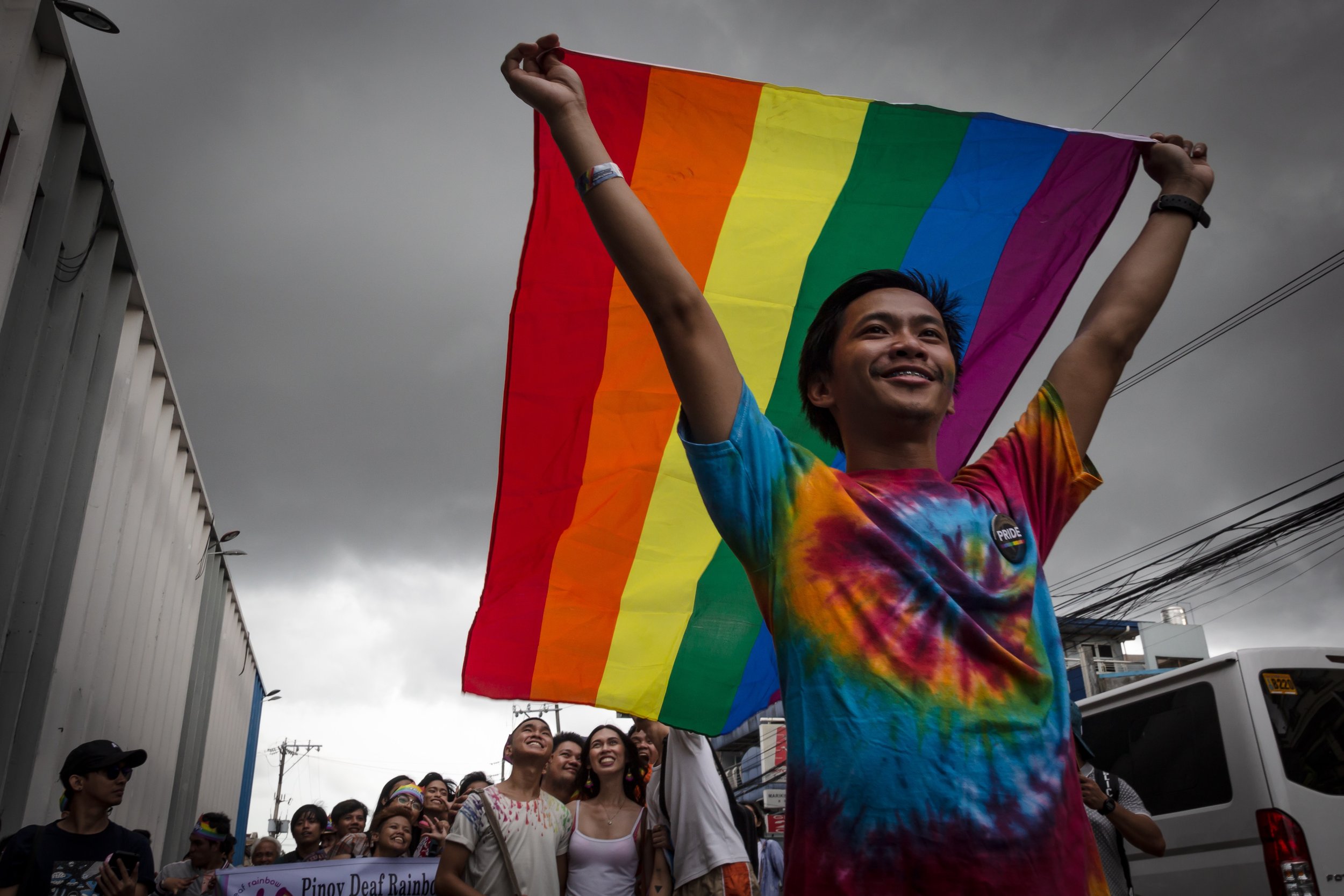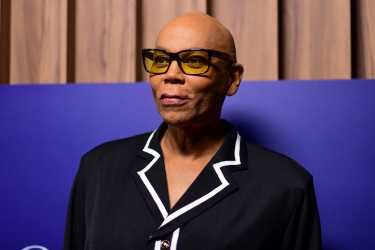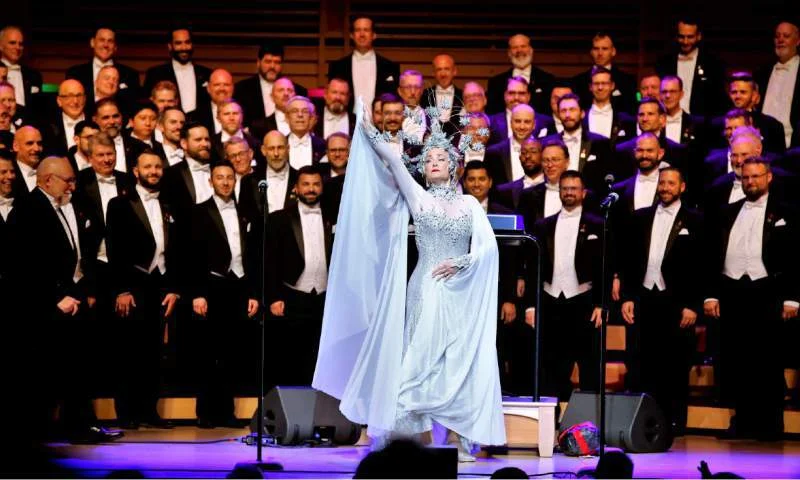Three years before the AIDS epidemic swept the nation in 1981, the San Francisco Gay Men's Chorus opened its doors. We couldn't imagine how much the crisis of AIDS in 1980s would affect our community and we could not have predicted how many people would turn to the Chorus for refuge and a sense of community.
Let’s take a look back at the AIDS epidemic history over the past 40 years and how it affected not only our Chorus and our community, but our entire society.
The Beginning of the 1980s AIDS Crisis
There is no clear explanation for the cause of HIV. The first recorded case was in 1959 in a Congolese man's blood sample. While he was HIV positive, the exact details of whether he developed and died of AIDS are unknown.
Decades later when the 1980s AIDS crisis started, there was only one understanding of HIV/AIDS: it only affected young gay men. These men soon developed uncommon opportunistic infections that previously only affected individuals with compromised immune systems and rare forms of cancer.
As a result, the Center for Disease Control (CDC) formed a Task Force in the summer of 1981 to address KS/OI (Kaposi's Sarcoma and Opportunistic Infections).
Although HIV and AIDS had originally surfaced decades prior, some believing as far back as the 1930s, the AIDS epidemic mercilessly swept across the United States and the world throughout the 1980s and early 1990s.
Today, more than 70 million people worldwide have HIV infections, and about 35 million have died from AIDS since the beginning of the epidemic.
The 1980s AIDS Crisis: Decade Timeline
While it is impossible to condense the AIDS crisis into one succinct timeline, here are some of the most significant events throughout the epidemic.
For a very detailed HIV/AIDS timeline, visit this in-depth resource from HIV.gov.
The 1920s-1950s
As early as the 1920s, Pneumocystis pneumonia outbreaks ravaged northern and central Europe, with premature infants being the primary victims as they peaked in the 1950s when post-war Europe began recovering.
Experts believed that contaminated glass syringes and needles significantly contributed to the spread of the disease. However, modern research suggests a deeper origin: a retrovirus similar to HIV or even a milder form of HIV. Some speculate Cameroon (which was once a German colony) introduced the virus to Europe.
The first wave of this epidemic occurred in Danzig City in 1939; it spread to neighboring countries like Switzerland and the Netherlands in the following years.
In December 1959, a Congolese man died of what is now known to be the first recorded case of HIV.
The 1960s
While the domestic history of the AIDS crisis is commonly thought of as beginning in the 1980s, at least two other cases of HIV occurred in the United States in the 1960s, both in children who had received blood transfusions.
The 1970s
In the 1970s, the groundwork for the AIDS crisis was being subtly laid, although the full-blown epidemic and awareness of it would emerge mainly in the subsequent decade.
The first recognized cases appeared in the late 1970s when individuals presented with rare diseases like Kaposi's sarcoma. In 1969, a teenager from St. Louis, Robert Rayford, passed away from an unidentifiable illness.
Eighteen years later, researchers at Tulane University discovered evidence of HIV in his remains. As the 1970s drew to a close, between 100,000 to 300,000 people might have already been infected with HIV.
Then, in 1980, the symptoms and cases became more noticeable, marking the beginning of a global health crisis that would be officially named and recognized in the 1980s
The 1980s AIDS Crisis
In June 1981, the CDC published a report on five previously healthy young gay men diagnosed with KS/OI. This was the first recognized sign of what would become known as the AIDS epidemic in the 1980s.
The term "AIDS" is officially coined in September 1982 by the CDC. HIV is said to have already spread to at least 15 countries by now.
Until 1983 the WHO released their first assessment of the global AIDS crisis, the disease was still widely believed to only be a “gay disease”. Included in the WHO's first assessment of the global AIDS crisis was the recognition of HIV/AIDS transmission through:
Blood transfusions (Blood banks in the United States and Europe start screening their blood supply for HIV by the mid 1980s, greatly reducing the risk of transmission through contaminated blood products)
Heterosexual contacts
Mother-to-child routes (infected mothers could pass HIV to their babies)
In 1985, researchers introduced antibody blood tests to screen for infections, though they had a limited scope. WHO emerged as a central figure in the AIDS battle. By 1986, Surgeon General C. Everett Koop clarified misconceptions about HIV transmission, urging nationwide education, condom use, and voluntary HIV testing.
The first World AIDS Day was observed on December 1, 1988, and has since been recognized annually as a day to raise awareness and support for those living with HIV. This day is also an opportunity to remember those who have lost their lives to AIDS-related illnesses.
The 1990s
1996 proved to be a momentous year in the history of the AIDS epidemic. The 11th International AIDS Conference took place in Vancouver, where a combination of antiretroviral treatment was introduced for the first time that proved to be effective against HIV. This was also the year the United Nations established the The Joint United Nations Programme on AIDS (UNAIDS).
The year following these events, 1997, was the first year the AIDS death rate declined since the epidemic began. Still, in 1997, UNAIDS estimates that, 30 million adults and children around the world had HIV, along with 16,000 people being newly infected with the virus each day.
In 1998, AIDSVAX began the first human trial of an AIDS vaccine for which more than 5,000 U.S. volunteers signed up.
The 2000s
In 2002, the Global Fund to Fight AIDS, Tuberculosis, and Malaria was created to fund programs aimed at preventing and treating these diseases. By 2019, the Global Fund has invested over $45 billion in efforts to end the epidemics.
Advancements in HAART
The 2000s also brought improved and more accessible antiretroviral drugs with fewer side effects. HAART regimens transformed AIDS treatment, making it possible for individuals to live longer, healthier lives.
Now, in 2023, modern antiretroviral therapy has made living with HIV/AIDS a manageable chronic condition. These medications suppress the virus, allowing individuals to maintain healthy immune systems and live longer lives.
Prevention and Education
Pre-exposure prophylaxis (PrEP) (which received FDA-approval in 2012) and post-exposure prophylaxis (PEP) are now widely available, offering protection to individuals at risk of contracting HIV. Education about safe sex and harm reduction strategies has played a crucial role in HIV prevention.
U=U: Undetectable = Untransmittable
Another relatively recent landmark development in AIDS treatment is the "U=U" campaign (launched in 2015), which stands for "Undetectable = Untransmittable." It means that individuals with an undetectable viral load cannot transmit the virus to their partners through sexual contact.
A Long Road Ahead
While significant progress has been made in AIDS treatment and prevention, challenges remain. Stigma, disparities in access to care, and the high cost of medications are ongoing issues that must be addressed.
What Was AIDS Called in 1981?
"Gay-Related Immune Deficiency" (GRID) was coined by doctors in 1981 to describe what would later become AIDS. Nevertheless, society at large referred to the virus as a "gay disease" due to its rapid spread within the LGBTQ+ community, particularly among gay men. Then, in 1982 the CDC coined the term AIDS for the first time.
Who Was the Most Affected by the AIDS Crisis in the 80s?
In the early 1980s, AIDS was initially perceived as a 'white gay disease,' affecting primarily white gay and bisexual men. This perception overshadowed the needs of ethnic minorities, leading to a lack of outreach and early treatment options for them.
However, by the mid-80s, the CDC observed that African Americans faced a disproportionate AIDS diagnosis rate. This spurred black activists to advocate for more inclusive AIDS campaigns and initiatives. Parallelly, black, gay, and lesbian communities launched campaigns emphasizing AIDS's non-discriminatory nature.
AIDS in the 80s and Beyond: The Impact on the San Francisco Gay Men’s Chorus
AIDS in San Francisco in the 1980s was devastating and catastrophic. Amid this crisis, the San Francisco Gay Men’s Chorus (SFGMC) emerged as an essential organization that not only provided support to those affected by AIDS but also raised awareness and fought against the stigma surrounding the disease.
Along with being a support system for its members who were living with AIDS or had lost loved ones to the disease, the SFGMC also suffered great losses within its own community.
Our founder, Jon Reed Sims, was diagnosed with AIDS in January 1984 and passed away six months later. Though Sims did not live long enough to observe the impact the San Francisco Gay Men's Chorus would have on gay communities nationwide, the Chorus was inspired to carry on his legacy.
In honor of Sims, we created the Fifth Section to commemorate the over 300 HIV-positive members of our Chorus who lost their lives to HIV/AIDS or other complications since his passing.
Members of our Fifth Section remain listed in our concert programs and on our website, ensuring their spirits and memories will remain alive. As the AIDS/HIV epidemic in the 80s raged, the Chorus gave many a platform to cope with grief and support one another. Through the support of our surviving and new members, we keep going and remind ourselves of the power of song during some of the most challenging times of our lives.
The Present: Why the HIV Epidemic is Not Over
As we touched on earlier, the HIV epidemic is far from over. Hurdles remain in not only overcoming the disease itself, but also the stigma and other challenges surrounding it.
Since the beginning of the epidemic of HIV in the 80s, over 40 years ago, researchers have examined how socioeconomic status, access to health care, and HIV/AIDS transmission affect communities and countries worldwide.
According to their findings, several factors significantly limit interactions between individuals living with HIV/AIDS and those without the condition.
These include:
Homophobia
The stigmatization of HIV/AIDS
A lack of public awareness (including HIV vaccine awareness)
These barriers can create a discouraging environment, ultimately hindering people from seeking care and support.
We must address these issues comprehensively to promote inclusivity, understanding, and access to healthcare services for all individuals affected by HIV/AIDS.
Even with the advancement in understanding and treatment, HIV/AIDS remains a severe health threat worldwide due to the lack of treatment centers, limited educational resources, and a shortage of STI testing centers.
AIDS prevention relies heavily on public awareness and education campaigns. Unfortunately, as much as 13% of HIV-positive people in the United States are unaware of their status. As a result, HIV-positive people are more likely to acquire AIDS and transmit HIV without treatment.
San Francisco General Hospital developed a holistic approach to HIV/AIDS care in 1983, still in practice today. They focus on raising awareness, educating patients and the public, and addressing social, psychological, economic, and medication aspects.
They offer:
HIV testing
Counseling
Financial assistance
Housing
Home care
Emotional support
Community education
The hospital also provides specialized training for physicians and nurses.
HIV/AIDS: The Stigma
As the stigma surrounding HIV/AIDS remains prevalent in our society, it's worth noting again how societal attitudes contribute to the spread of HIV. The fear, misinformation, and discrimination associated with HIV/AIDS can prevent individuals from getting tested or seeking treatment. This results in a lack of awareness, further spreading the virus.
For our part, the San Francisco Gay Men's Chorus (SFGMC) is dedicated to breaking this stigma through its powerful musical performances and community outreach programs.
Make an Impact by Supporting Our Mission
During the AIDS crisis, for many, the San Francisco Gay Men's Chorus was not just about singing but a sanctuary and lifeline. Our music offered solace, strength, and empowerment during those dire times.
To combat HIV/AIDS, you can donate, participate in pride celebrations, educate yourself and others about the virus, or be an LGBTQ+ ally. Your support for the San Francisco Gay Men's Chorus enables us to produce impactful music, foster community, inspire activism, and spread compassion globally.
Please consider donating to aid our mission against HIV/AIDS. Every contribution counts.

























